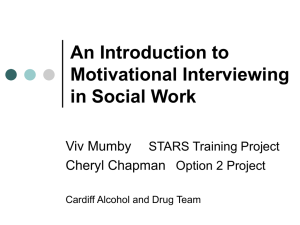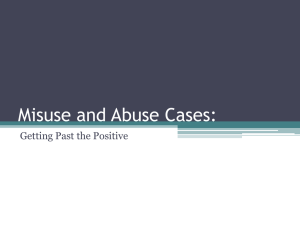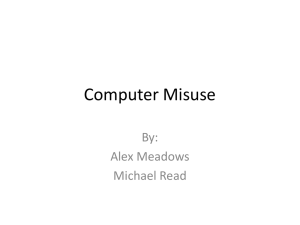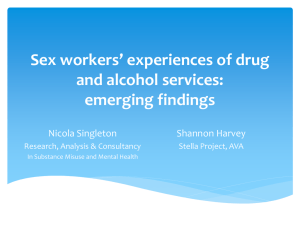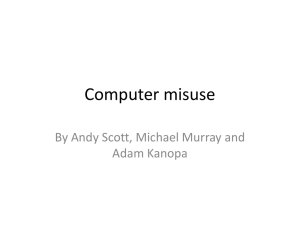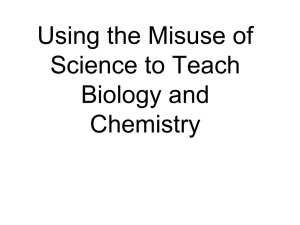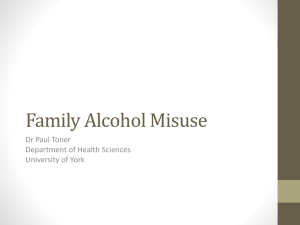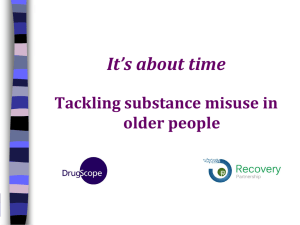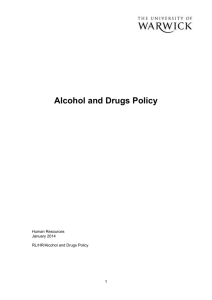Susan Scally - Northwest Regional Drug & Alcohol Task Force
advertisement
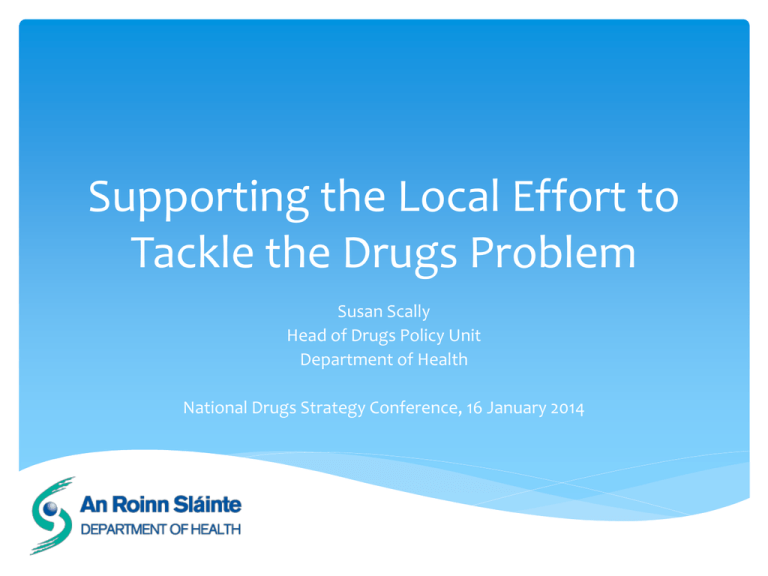
Supporting the Local Effort to Tackle the Drugs Problem Susan Scally Head of Drugs Policy Unit Department of Health National Drugs Strategy Conference, 16 January 2014 Overall Strategic Objective of the NDS To continue to tackle the harm caused to individuals and society by the misuse of drugs through a concerted focus on the five pillars of supply reduction, prevention, treatment, rehabilitation and research Specific objective in relation to coordination To bring greater coherence to the coordination of substance misuse policy in Ireland across all sectors; and To maintain and strengthen partnerships with communities to tackle the problems of substance misuse NDS Coordination Mechanisms Oversight Forum on Drugs responsible for high level monitoring of progress achieved across the National Drugs Strategy; Local and regional drugs task forces which coordinate action at local and regional level ; Drugs Advisory Group (to be replaced by National Coordinating committee for Drug and Alcohol Task Forces meeting on 23 January 2014). Overview of Process So Far Cabinet Committee on Social Policy seek assessment of impact of Drugs Task Forces Review of Drugs Task Forces and National Structures Changes to Task Forces announced Alcohol Policy adopted by Government Bilateral meetings under National Drugs Strategy Coordination of Substance Misuse Policy Bilateral Meetings under Paragraph 6.60 of the Strategy Meetings held by Minister In order to maintain focus on drug-related issues & interagency approach, Minister White met with: Community and Voluntary Sectors; 4 Networks of Local and Regional Drugs Task Forces Minister for Justice Equality & Defence, Social Protection, Education & Science, and Children and Youth Affairs; The Garda Commissioner; The Chairman of the Revenue Commissioners; Director General of the HSE; Director General of the Irish Prison Service; The Director General of the Probation Services; Chairperson of the National Advisory Committee on Drugs and Alcohol Supply reduction An Garda Síochána and Revenue’s Customs Service joint operations result in significant seizures of drugs; Significant seizures of NPS by Revenue’s Customs Service – shift to internet outlets an emerging challenge; Drug-related Intimidation Programme - partnership between Gardaí, Family Support Network and HSE; Inspector in every Garda Division to target adults in the drug trade who use children to run drugs. Education and Prevention 90.2% of children sit Leaving Certificate – protective factor; Outcomes focussed Children and Youth Strategy Framework in final stages of development; 30% of children live with parental alcohol substance misuse – HSE Project on Hidden Harm; Supports for children and young people at risk in high support settings (Assessment, Consultation and Therapy Service) – HSE, Irish Youth Justice Service Treatment Nationwide access to treatment services; Almost 100% of 0/18s access treatment within 1 month; Almost 100% of u/18s access treatment within 1 week; • Probation service work with Irish Prison Service, Gardaí and treatment services to intervene with clients with substance misuse problems; 3 main health issues affecting prisoners are mental health, poor physical health and drug addiction; Expansion of drug treatment (including Methadone treatment) and other health and social services in prisons and in reach services as required Protocol in place for seamless provision of treatment services between prison and the community Drug treatment in prisons contributing to a reduction in the incidence of post release overdoses Rehabilitation Very positive feedback from NDRIC evaluation – Drugs Task Force played key role; National roll out of NDRIC planned; Issue with take-up of places on Drugs Specific CE Schemes; Drugs specific CE scheme model being examined by Advisory Committee under aegis of Department of Social Protection Summary of outcomes from Bilateral Meetings Improvements in treatment infrastructure Evidence of coherence in the coordination of substance misuse policy; Local innovation and best practice leading to national roll out of initiatives; Multi-agency approach is mainstream Substance misuse a key challenge National Coordinating Committee National Coordinating Committee for Drugs Task Forces meets on 23 January 2013. Its terms of reference are: - to drive implementation of the National Drugs Strategy at Local and Regional Level; - to oversee, monitor and support the work of the Task Forces and to ensure that policy on drugs is informed by their work; - to monitor implementation of NDS actions specific to Drug and Alcohol Task Forces; - to monitor the expenditure and activities of the Task Forces and of drugs projects in their areas and to - Make recommendations to the Minister in relation to the implementation of the NDS and effective coordination of service delivery at local and regional level Membership of National Coordinating Committee Statutory Sector: Department of Health, HSE, An Garda Síochána, Justice, Equality and Defence, Revenue’s Customs Service, Children and Youth Affairs, Education and Skills, Environment, Social Protection, Community and Local Government, Local Government Management Agency, The Probation Service, Education and Training Boards. Community Sector: (2) Voluntary Sector: (2) LDTF Chairs Network (2) and LDTF Coordinators Network (2) RDTF Chairs Network (2) and Coordinators Network (2) Role of NCC in supporting the local effort to tackle the drug problem Brings together Local and Regional Drugs Task Forces, key Government departments and agencies and the community and voluntary sector; Roles and responsibilities of members clearly set out to encourage optimum participation; Strengthened accountability and feedback mechanisms; Opportunities for sharing best practice; More outcomes focussed. Terms of Reference of Task Forces To implement the National Drugs Strategy in the context of the needs of the region/local area; To support and strengthen community based responses to drug misuse; To maintain an up-to-date overview on the nature and extent of drug misuse in the area/region; To identify and report on emerging issues and the development of proposals on policies or actions needed to address them; To promote the implementation of local/regional drug strategies; and To monitor, evaluate and assess the impact of the funded projects and their continued relevant to the local/regional drugs task force strategy and to recommend changes to the funding allocations as deemed necessary. Strengthening engagement in Task Forces NCC will support Task Forces in change process, including: Adoption of their new terms of reference; Criteria for membership and tenure of members; Measures to strengthen governance and decision making; Monitoring and reporting arrangements; Supporting local services to achieve quality standards in the delivery of services Key Outcomes of Review National Coordinating Committee to guide work of Task Forces and drive implementation of NDS locally Direct representation for Task Forces on the NCC and OFD New terms of reference for Task Forces New measures to reinvigorate participation in Task Forces Agreement on policy to tackle alcohol misuse Government has approved a package of measures to address the excessive consumption of alcohol; Public Health (Alcohol) Bill will provide for o Minimum unit pricing for retailing of alcohol products o Regulation of marketing and advertising of alcohol; o Regulation of sports sponsorship; o Structural separation of alcohol from other products; o Enforcement powers for Environmental Health Officers in relation to alcohol; and o Health labelling of alcohol products Alcohol Policy Government accepted broad thrust and evidence base of the Steering Group Report on a National Substance Misuse Strategy. Its recommendations are grouped under the five pillars of: 1. 2. 3. 4. Supply Reduction: Control the availability of alcohol; Prevention: Raise awareness generally and deploy measures to delay children starting to drink; Treatment and Rehabilitation: Develop a national treatment and rehabilitative service that promotes early intervention and that is based on integrated care – emphasis on Family Support Services Research: Collect data on alcohol to identify the prevalence and patterns of alcohol use and misuse. Healthy Ireland Vision where everyone can enjoy physical and mental health and well being to their full potential, where wellbeing is valued and supported at every level of society and is everyone’s responsibility
